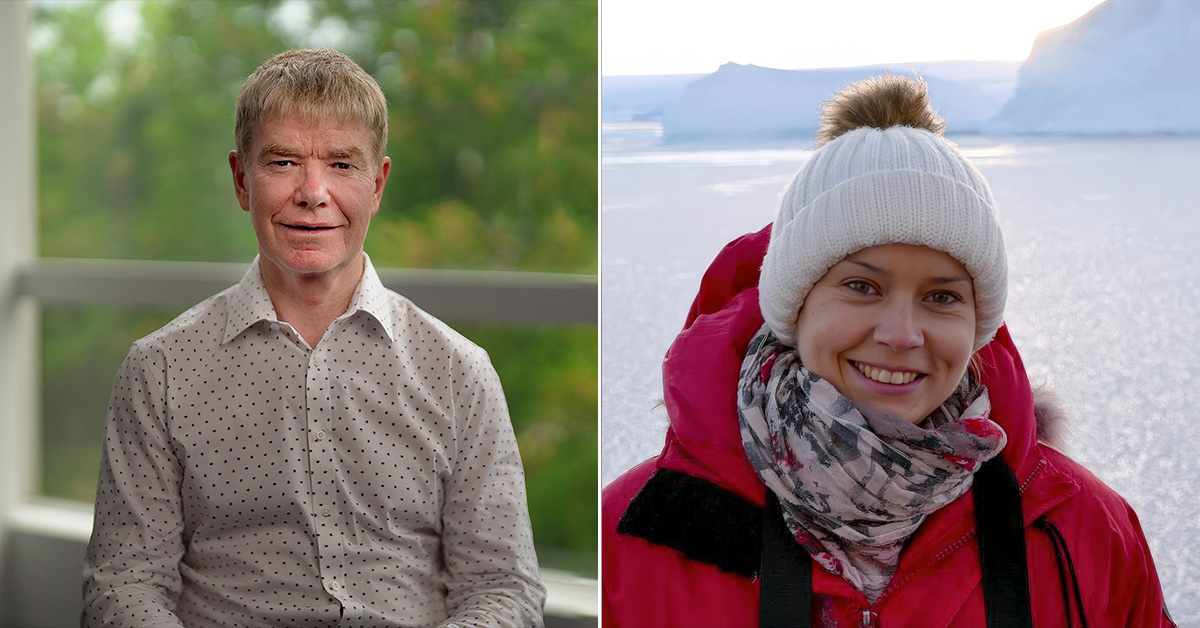
Two distinguished researchers in the field of Antarctic science and conservation have been recognised as 2025 honorific award recipients by the Australian Academy of Science.
Find out about all our 2025 honorific awardees.
Professor Steven Chown FAA, Monash University
Academy Fellow Professor Steven Chown has been awarded the Suzanne Cory Medal, recognising his outstanding research in biological sciences across his career.
With over 30 years of field experience in Antarctica, Professor Chown has made profound contributions to understanding biodiversity variation and developing conservation strategies to mitigate the impacts of environmental change.
Professor Chown co-developed the field of macrophysiology - the investigation of large-scale patterns in physiological variation and their ecological implications. His work has revealed that invasive species have greater physiological tolerances than their indigenous counterparts, potentially advantaging them in the changing climate.
"I have always been interested in the natural world, and apparently with observational patience from a young age," Professor Chown said.
"Science has enabled me to see our world in a multitude of different ways, through my eyes, and through the profound vision of others."
His research has transformed understanding of Antarctic biodiversity, identifying the mechanisms structuring its variation and the approaches needed to secure that variation as the environment changes. His work has revealed that speciation events since the Miocene epoch - extending from around 23 to 5 million years ago - were important for generating terrestrial diversity in the broader Antarctic, previously a pattern identified only for marine species.
Science has enabled me to see our world in a multitude of different ways, through my eyes, and through the profound vision of others.
Professor Chown's continent-wide investigation of foreign species transport to Antarctica has also proven prescient. His collaborative research identified high-risk locations on the Antarctic Peninsula - precisely where independent researchers later discovered some of the first widely established invasive species.
His research directly informs policy development by the Antarctic Treaty Consultative Parties, leading to protocols for reducing species transfer by ships, aircraft and visitors. As President of the Scientific Committee on Antarctic Research from 2016-21, he provided critical scientific advice on environmental and science policy matters.
"Through my research and capability, I have been in the fortunate position to contribute to international Antarctic environmental and science policy," said Professor Chown, who currently leads the nationally funded Special Research Initiative Securing Antarctica's Environmental Future.
Dr Linda Armbrecht, University of Tasmania
Dr Linda Armbrecht has received the Dorothy Hill Medal for her exceptional contributions to Earth science, continuing the legacy of women in scientific leadership.
Dr Linda Armbrecht has pioneered techniques to extract and analyse ancient DNA preserved in seafloor sediments (sedimentary ancient DNA, or 'sedaDNA'). Her work addresses crucial gaps in our understanding of past marine ecosystems, particularly for organisms that don't leave fossil records.
"I specialise in palaeo-genomics, specifically, the study of sedimentary ancient DNA preserved in the seafloor," explained Dr Armbrecht. "My focus region is Antarctica, where my research generates new insights into how marine organisms have responded to climate variabilities through time."
Her innovative methods have pushed the boundaries of what's possible in the field.
"This has resulted in our ability to detect minuscule amounts of genetic material preserved in the deep seafloor, and over much longer times than we initially expected," she said.
Her team's groundbreaking research has extended the Antarctic marine sedaDNA record back to at least 1 million years - an achievement that allows "novel investigations into ecosystem dynamics over several glacial-interglacial cycles, including major global warming events, providing a biological equivalent to atmospheric climate records".
My focus region is Antarctica, where my research generates new insights into how marine organisms have responded to climate variabilities through time.
Dr Armbrecht's expertise has earned her invitations to participate in numerous Antarctic voyages.
"To date, I've travelled to Antarctica five times, and am about to embark on my sixth expedition to the icy continent leading my own voyage to the completely under-explored Cook Glacier marine region in 2026," she said.
In 2021, she was awarded an Australian Research Council Discovery Early Career Researcher Award, which enabled her to establish her own research group at the Institute for Marine and Antarctic Studies (IMAS).
"I feel very fortunate to be leading this group where everyone is so passionate about applying and further developing these new genetic tools for polar ecosystem reconstruction with the goal to improve future predictions," she says.
Her work provides critical insights into how keystone species like plankton and krill - which form the base of polar food webs - have evolved and adapted to past climate changes, offering vital clues about how Antarctic ecosystems might respond to future climate challenges.
Recognising excellence in science
The Suzanne Cory Medal, awarded to Professor Chown, recognises outstanding research in biological sciences and honours the contributions made to science by Professor Suzanne Cory AC FAA FRS, a molecular biologist who has made major contributions to understanding the genetic causes of cancer.
The Dorothy Hill Medal, received by Dr Armbrecht, honours the contributions of the late Professor Dorothy Hill AC CBE FAA FRS to Australian Earth science and her work in opening up tertiary science education to women. Professor Hill made history as Australia's first woman Professor in 1959 at the University of Queensland and as the first Australian woman Fellow of both the Australian Academy of Science (1956) and the Royal Society of London (1965).
Both researchers exemplify Australian leadership in Antarctic science, combining rigorous research with practical applications for conservation. Their work underscores the critical importance of Antarctic research - not only for preserving this unique environment but also for understanding broader patterns of climate change and biodiversity conservation globally.
This knowledge, as Dr Armbrecht said, "improves predictions of the extent and speed at which Antarctic marine communities can adapt to ongoing environmental change, ultimately helping us to manage marine resources in Antarctica".






